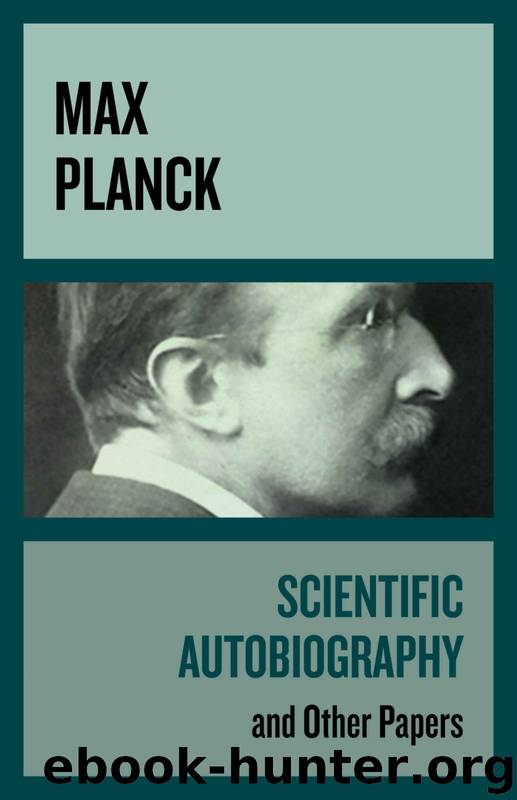Scientific Autobiography by Max Planck

Author:Max Planck [Planck, Max]
Language: eng
Format: epub
Tags: retail, nonfiction, Letters & Correspondence, science, physics, autobiography
ISBN: 9781497676183
Publisher: Philosophical Library/Open Road
Published: 2014-11-04T00:00:00+00:00
IV.
But why all this enormous labor, demanding the best efforts of countless soldiers of science during their entire lives? Is the ultimate result—which, as we have seen, in its individual details always drifts away from the immediately given facts of life—truly worth this costly effort?
These questions would indeed be justified if the meaning of exact science were limited to a certain gratification of man’s instinctive yearning for knowledge and insight. But its significance goes considerably deeper. The roots of exact science feed in the soil of human life. But its link to it is twofold. For it not only has its source in experience, but also has a retroactive effect on human life, both material and spiritual, and the more freely it can unfold itself, the stronger and more fruitful is this effect. This manifests itself in a very peculiar manner. First, as we have found, when science works on the world picture of its own making, its quest of metaphysical Reality causes it to drift always farther and farther away from the immediate facts and interests of life, since it always takes to less intuitive and more solitary trails. But these trails, and only these, are the very paths leading toward a discernment of new laws of interrelations, which would be inaccessible in any other way, and which can then be made relevant for human experience and thus made to serve human needs.
This fact can be observed in countless individual instances. Here, too, a far-reaching division of labor has proved its worth excellently. The first step, the moulding of the world picture from its beginnings in ordinary experience, is the task of pure science. The second step, the practical utilization of the scientific world picture, is the task of technology. Both these tasks are equally important, and since either of them demands a man’s full energy, if an individual scientist wants to make progress in his work, he must concentrate all his energy on one single task and for the time being forget completely other problems and interests. For this reason, never reproach the scholar too harshly for his other-worldliness and his indifference to important problems of human society. Without such a one-sided attitude, Heinrich Hertz could never have discovered radio waves, or Robert Koch the tubercle bacillus. These gifts of pure scientific research to practical life have their counterparts in the manifold stimuli and intelligent assistance which science receives from technology, a fact that is becoming progressively more manifest in our day and whose importance cannot be assessed too highly.
I feel I must discuss here a little more closely, by way of an example, a very recent and very impressive case of the often quite unsuspected close interrelation of science and technology. For a great number of years, only men of pure science were interested in the distinctive facts of atomic transformations. To be sure, the magnitude of the energies thus released did attract attention, yet since atoms were so infinitesimally small, no serious thought was given to the possibility that one day they might acquire practical significance, too.
Download
This site does not store any files on its server. We only index and link to content provided by other sites. Please contact the content providers to delete copyright contents if any and email us, we'll remove relevant links or contents immediately.
Hit Refresh by Satya Nadella(9134)
When Breath Becomes Air by Paul Kalanithi(8447)
The Girl Without a Voice by Casey Watson(7889)
A Court of Wings and Ruin by Sarah J. Maas(7847)
Do No Harm Stories of Life, Death and Brain Surgery by Henry Marsh(6941)
Shoe Dog by Phil Knight(5268)
The Rules Do Not Apply by Ariel Levy(4969)
A Higher Loyalty: Truth, Lies, and Leadership by James Comey(4964)
Hunger by Roxane Gay(4928)
Tuesdays with Morrie by Mitch Albom(4784)
Everything Happens for a Reason by Kate Bowler(4743)
The Immortal Life of Henrietta Lacks by Rebecca Skloot(4588)
Millionaire: The Philanderer, Gambler, and Duelist Who Invented Modern Finance by Janet Gleeson(4478)
How to Change Your Mind by Michael Pollan(4356)
All Creatures Great and Small by James Herriot(4322)
The Money Culture by Michael Lewis(4207)
Man and His Symbols by Carl Gustav Jung(4135)
Elon Musk by Ashlee Vance(4127)
Tokyo Vice: An American Reporter on the Police Beat in Japan by Jake Adelstein(3996)
